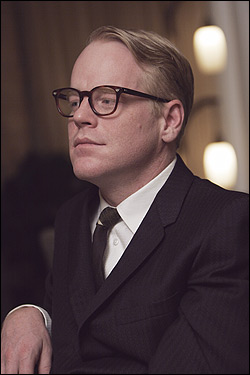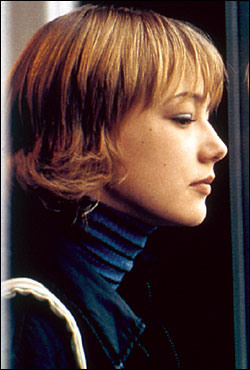The 30th Toronto International Film Festival is now history, an orgy of 256 films from 60 countries that concluded Sept. 18. And like any orgy worthy of the name, the highs were very high and the lows made you headachy and regretful (“Why did I waste my time with that one?”).
Usually, I head for the smaller films, which sadly tend to live and die within that one festival, like butterflies. Not this year. I wanted to find out what some of my longtime favorite directors had been up to, and the news is nearly magical—including a terrific Seattle success story. We’re in for a memorable autumn, with good and even great films on every possible subject, so here’s a quick clip-and-save.
Ang Lee’s Brokeback Mountain (opens Dec. 16) is tender and breathtaking, and how it got turned down by Cannes and, more appallingly, the New York Film Festival is something to ponder. Having just reread Annie Proulx’s very short New Yorker story, I’m amazed at how faithful Larry McMurtry and Diana Ossana’s screenplay is, and yet how much Lee has let the film expand and breathe on-screen. Spanning 20 years, it’s a story of two cowboys who find themselves irrevocably attracted, without the slightest idea of where to go from there. Jake Gyllenhaal is fine, while Heath Ledger is the film’s pure astonishment.
Capote (Oct. 21) simply doesn’t put a foot wrong as it follows Truman Capote through his groundbreaking reporting on the Clutter family murder case in 1959 Kansas, which led to his “nonfiction novel” In Cold Blood. Director Bennett Miller and screenwriter Dan Futterman give the film perfect pitch. Although Capote is anchored by Philip Seymour Hoffman’s almost preternatural disappearance into the tiny, bird-voiced Capote, the chemistry between him and Catherine Keener (playing fellow writer and confidante Harper Lee, the story’s moral center) is equally powerful. The moral dilemma for Academy voters may be choosing between Hoffman and Ledger, and I’d hate to be in their shoes.
The Heart of the Game is an exceptional Seattle documentary by newcomer Ward Serrill. Even a girls’ basketball innocent like me, who felt Heart‘s impact first at SIFF, could identify with the film’s power. Clearly, even less-demonstrative Canadians got it, too. They cheered Serrill’s seven-year-long chronicle of the Roosevelt Roughriders, their wild-man coach, Bill Resler, and the personal odyssey of their unstoppable guard, Darnellia Russell, as wildly as any championship hockey heart stopper. As reported here last week, in a Seattle first, it was picked up by the “new” (Weinstein-less) Miramax for a reported $1 million for distribution in 2006.
The Squid and the Whale (October) was given prizes at Sundance and lavish appreciation here by Tim Appelo. They were both right, and no one should miss this hilariously venomous piece of parent appreciation by Noah Baumbach (Kicking and Screaming) with Laura Linney and, especially, Jeff Daniels.
As for David Cronenberg’s taut, thoughtful and not-to-be missed A History of Violence (already in theaters), it certifies that Viggo Mortensen has a great deal more to him than “just” epic heroism. He’s the almost perfect embodiment of a thoughtful contemporary antihero.
Steven Soderbergh’s stunning Bubble (2006 perhaps) uses nonprofessionals in a story grown from their lives as blue-collar workers in southern Ohio, then given a Soderberghian twist (in hi-def). If you’ve read Barbara Ehrenreich’s Nickel and Dimed, you’ll know the cast’s ongoing struggle. And if you know Soderbergh, the news that it’s set in a doll factory is fair warning that the visuals will haunt you, too.
Heaven knows how long it will be before we see Hou Hsiao-hsien’s gorgeous, deeply affecting Three Times in Seattle; start nagging the splendid Northwest Film Forum programmers now. Using the same two actors across three resonant—and shuffled—periods of Taiwanese history, 1966, 1911, and 2005, Hou creates three entirely different shooting styles (the 1911 segment is a silent film, with intertitles) while expanding on his primal themes of fidelity and the evanescence of memory.
James Mangold’s Walk the Line (Nov. 18) rises above biopic expectations with the life-or-death intensity of the love scenes between Joaquin Phoenix’s Johnny Cash and Reese Witherspoon’s June Carter, and with the surprise of how good both their voices are. No one will ever quite sound like Cash, but Phoenix gives us the whole man and a decent approximation of his voice.
Finally, there is Ballet Russes (Nov. 18), a sensational, essential documentary by Dayna Goldfine and Dan Geller, who tracked down the irresistible “baby ballerinas” of the ’30s and ’40s. Along with premier danseur Frederic Franklin, they are revealed to be as magical now as they were in their prime. As for Franklin, pink-cheeked and crystal clear at 91, he’s still staging ballets all over the world, continuing his association with American Ballet Theatre. There in Toronto, he was outlasting the most heroic partyers. There’s nothing like the discipline of ballet, nothing.
As for the experience of this festival, in a barely acknowledged quid pro quo, Toronto provides red carpets, galas, screaming fans, and a truly ga-ga brand of journalism by star-struck columnists in exchange for fleeting access to the talent, heavily watchdogged by their publicists. Considering that barely eight blocks away, vans and trailers from those same studios are clogging Toronto streets, it’s a wonder that close elevator contact with, say, Thank You for Smoking‘s Aaron Eckhart could become the stuff of an entire column, but it does here.
That kind of breathlessness, combined with the Canadian news contingent’s growing disinterest in the aftermath of Katrina (busy as it was with the “secret” wildly unexpurgated tapes by former Prime Minister Brian Mulroney), made TIFF ’05 a more than usually intense experience—deeply satisfying, deeply surreal.








